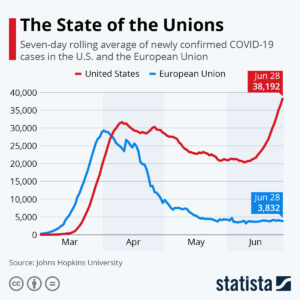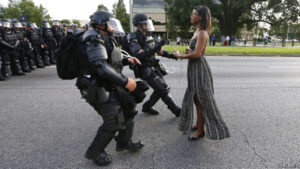by Ross Bishop
 Today the world faces three major crises and in addition America faces a political catastrophe. We’ll settle the catastrophe Nov. 3rd, but the other three: Black Lives Matter, the COVID-19 pandemic and Global Warming are going be with us for a while. What are we to learn from these three phenomenon?
Today the world faces three major crises and in addition America faces a political catastrophe. We’ll settle the catastrophe Nov. 3rd, but the other three: Black Lives Matter, the COVID-19 pandemic and Global Warming are going be with us for a while. What are we to learn from these three phenomenon?
Regarding Black Lives Matter, although we do not like to acknowledge it, slavery has a long history in the west. Five thousand years ago, slaves built the Egyptian pyramids. The roads and aqueducts connecting the far reaches of the Roman Empire were built by slaves. The plantations and mines that fueled the British Empire were driven by slave labor. Upper middle class families in America and Europe would’ve had very different lives were it not for slave butlers, cooks, housekeepers and nannies. In the American south, the cotton and tobacco plantations could not have functioned without slave labor. The great houses of American government, The Capital Building and The White House, were built by slaves.
 Ever since the first slave ship landed in America in 1619, people have complained about the problems of slavery, not to mention the Civil War. For many years Black people have railed about the injustices foisted upon them by white society, the lynchings, poor schools, no economic future, but we didn’t want to hear them. After all, they were just former slaves.
Ever since the first slave ship landed in America in 1619, people have complained about the problems of slavery, not to mention the Civil War. For many years Black people have railed about the injustices foisted upon them by white society, the lynchings, poor schools, no economic future, but we didn’t want to hear them. After all, they were just former slaves.
Fifty years ago, in 1968, The Kerner Commission investigated the sources of racial disparity in America, and accurately identified the sources of racial problems as poor education, few jobs, red line housing discrimination, economic disparity, poor medical care, police violence, gangs and the vestiges of Jim Crow and white supremacy. The country wasn’t willing to provide meaningful solutions to the problems that The Kerner Commission identified. Attempts to correct some of the issues were made, but they were mostly cosmetic.
In 2016 Colin Kaepernick lit a spark by taking a knee during the national anthem at a football game. Then the murders of innocent black men by militarized police over the last several years have finally pushed racial disparity and other issues of minority culture into the national spotlight.
The CORONA pandemic presents another but related, set of issues. The virus is spread through social contact, meaning that each of us has a responsibility to not pass the infection on to others. Preventing the spread of the disease is made possible by social distancing and face masks. However some Americans, including The President and his supporters, refuse to have their “social rights” tread upon, even though these simple measures have been shown to dramatically reduce the spread of the disease and could literally save hundreds of thousands of lives.
 Nor does it seem to matter that these same people obey seat belt laws, traffic lights, submit to DWI and other traffic laws, pay taxes and adhere to “No shoes, no shirt, no service” rules every day. Red states that refused to head the warning of medical experts and take strict measures early on are now paying a heavy price as their citizens suffer through the inevitable effects of not controlling the contagion.
Nor does it seem to matter that these same people obey seat belt laws, traffic lights, submit to DWI and other traffic laws, pay taxes and adhere to “No shoes, no shirt, no service” rules every day. Red states that refused to head the warning of medical experts and take strict measures early on are now paying a heavy price as their citizens suffer through the inevitable effects of not controlling the contagion.
Simultaneously protestors are trying to wake us up to the problems of being a minority in today’s society. They ask us for greater equality and for an end to white supremacy and Jim Crow. They want us to revise the standards of gestapo-like police conduct and a grossly unbalanced criminal justice system. They are asking us to bring social resources to bear on the situation, not just a gavel and a gun. They are asking for upgrades to ghetto schools, decent hospitals and a stop to de-facto red-line practices in housing. They ask us to put an end to Gerrymandering and voter suppression, for assistance with job training and job creation and minority business loans. In summary, what they are asking is that we extend to them the same considerations that we already give the rest of white society.
Global warming presents us with another opportunity to extend our compassion, only in this instance the consequences are both more distant and far more dire. We are literally destroying the very planet that we depend on for our sustenance. How crazy is that? The forests, oceans and the land are being consumed by unmitigated greed with no real consequence for their collective impacts. Global temperature is increasing at a never before seen rate and before long its impacts will become catastrophic.
The lesson contained in these three problems is a simple one: “Have compassion for the less fortunate.” “Have compassion for the earth.” That is not a new lesson. Two thousand years ago Jesus offered us a new commandment when he admonished us to “Love one another as I have loved you.” And that’s not the first time we have heard that maxim. Compassion is the basis for ahimsa, a core virtue in Hindu philosophy. According to Hindus, Gautama Buddha, the embodiment of compassion, was Vishnu’s (the god of compassion) most recent incarnation.
My point is that for thousands of years before Christ, spiritual teachers of all kinds have encouraged us to “Love one another.” And although great strides have been made in civil and social laws and morays and environmental protection, they have also been woefully inadequate measures. Today we have the opportunity to make significant steps to correct those deficiencies.
What the minority community needs is our compassion and all that goes with it – decent hospitals, schools, jobs, safe streets and demilitarization of the police. Sacrificing a few F-35 fighter jets could pay for all of that.
What the environment needs is either a revolution around the concept of greed (unlikely) or strict new global standards of environmental preservation, recognizing that the very survival of our fellow beings and those who come after us, is at stake. If we screw this one up, we screw ourselves – after all, there is no planet “B.” You’d think that the threat to survival would be enough, but other than things getting warmer, the change hasn’t affected us individually, but by the time it does, it will be too late.
What COVID asks of us is for a short time to set aside our egos and have compassion for others, especially the elderly and the vulnerable – to wear masks and social distance and for a while, be willing to give up the need to go to bars, the beach, go to parties and otherwise assemble.
Today, we see many people putting their lives at risk to sustain and care for the rest of us. It starts with the health workers who care for the sick. In many cases they stand in for families who are not allowed to be with the dying.
Then there are those in the “ invisible work force,” who keep essential services operating: the transport workers, supermarket staff, hospital orderlies, truckers, pharmacists, paramedics, mortuary technicians, trash collectors, postal workers, firemen and so many others, many of them working for 20% less than employees in other industries and whose jobs have been decimated by shut-downs and layoffs.
So you must ask yourself, “Where am I on the scale of social compassion?” “How much do I really care about others or the planet?” Have you marched? Have you volunteered at your local food bank? As stressful as it may be, have you taken any of these matters up with your government representatives? A lot of change has to happen and it won’t happen without considerable social pressure against the entrenched special interests.
Have you made COVID masks or volunteered at your local hospital? Have you volunteered for meals on wheels? What about tutoring minority kids or providing help to the elderly or the disabled? Or, will you just sit on your couch and continue to post your complaints to Facebook?
copyright©Blue Lotus Press 2020
